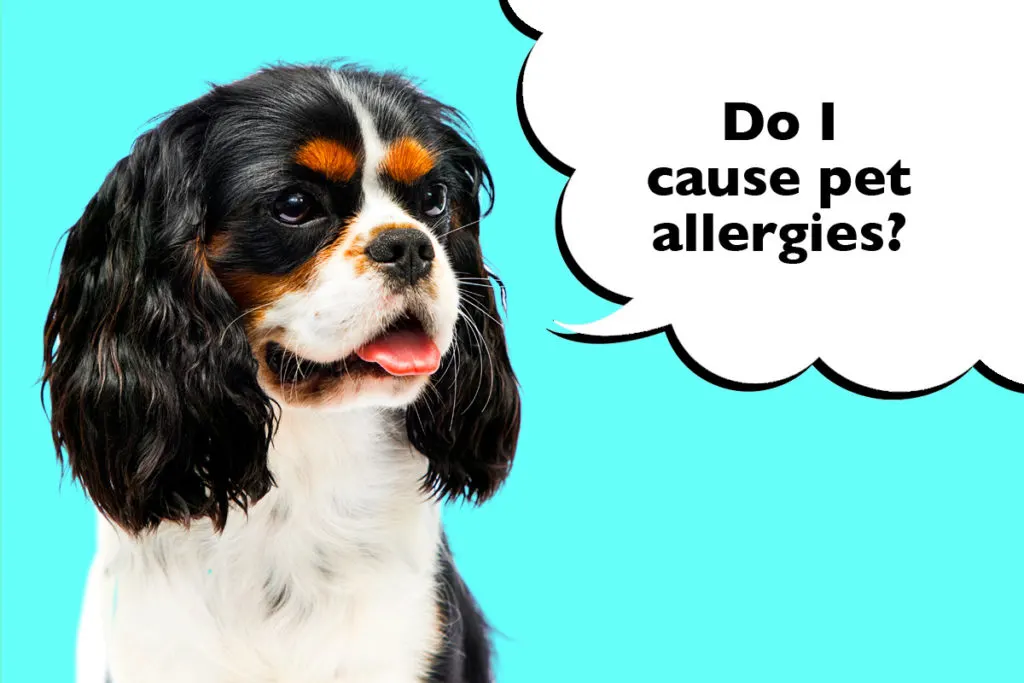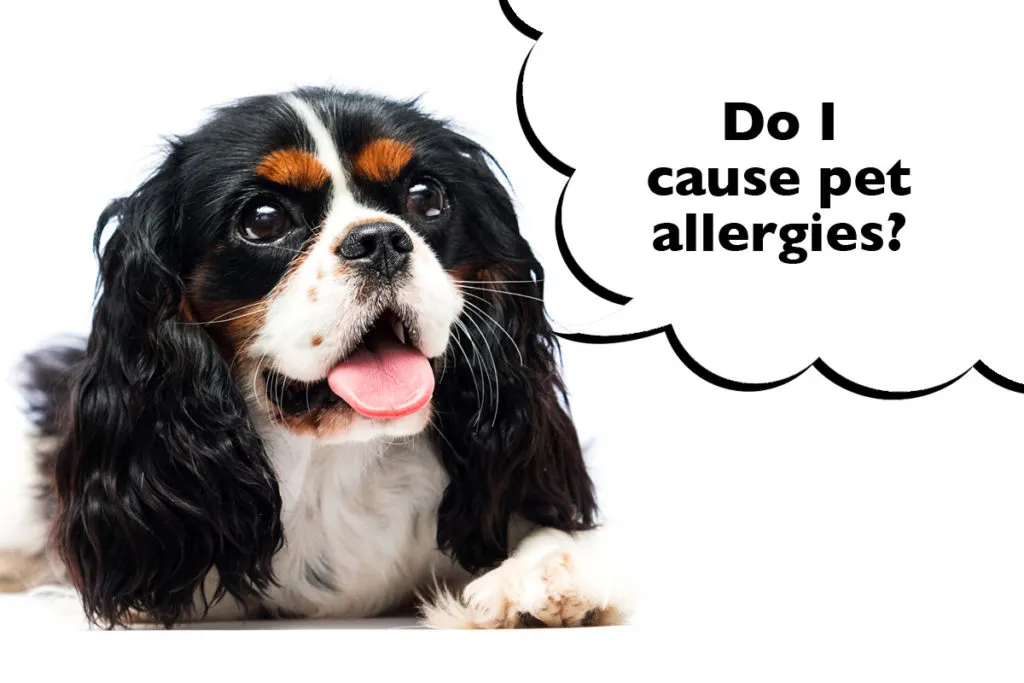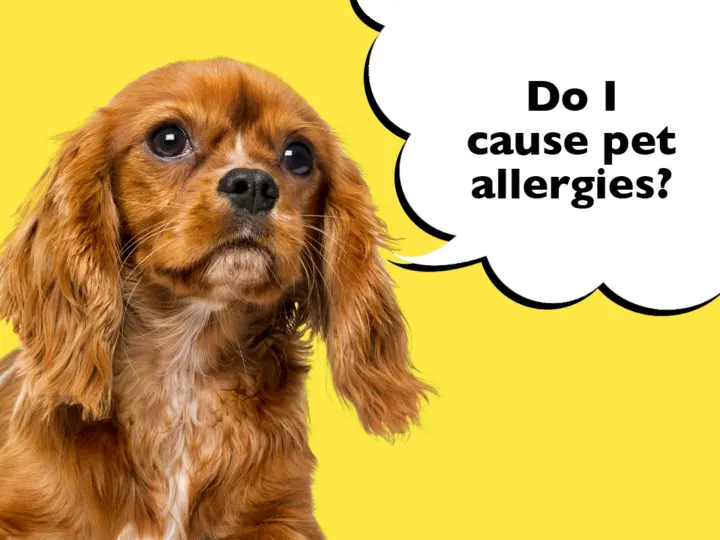Are you thinking of getting a Cavalier King Charles Spaniel puppy? Do you have pet allergies and are wondering how you may react? Here’s everything you need to know about whether Cavalier King Charles Spaniels are hypoallergenic.
Are Cavalier King Charles Spaniels Hypoallergenic? No, Cavalier King Charles Spaniels are not hypoallergenic. They have mid-length silky coats that shed moderately all year. Being single coated, they do shed less dander than other breeds but can still cause issues for pet allergy sufferers.
Read on to find out what causes people to be allergic to Cavalier King Charles Spaniels, whether people with pet allergies can live with them, and what you can do to limit dander within your home.
Never use the advice in this article as a substitute for professional veterinary advice or treatment. I am NOT a Vet, qualified dog trainer or dog behaviourist. This article is based on research, personal opinion and experience of owning dogs over the last 12+ years.
What Is A Hypoallergenic Dog?
A hypoallergenic dog is one that’s less likely to cause allergic reactions to people with allergies.
In reality, there’s no breed of dog that can be considered completely hypoallergenic. Even those that don’t shed much can still cause reactions for allergy sufferers.
However, some breeds are known to cause fewer allergic reactions for some people. Breeds like Poodles, Bichon Frise and Schnauzers are all considered more hypoallergenic than other dog breeds.
But, there are no guarantees that a particular dog won’t cause pet allergies for a person. It’s very much a personal situation that must be judged on a case-by-case basis.
Are Cavalier King Charles Spaniels Good For Allergy Sufferers?
Cavalier King Charles Spaniels are not a good option for allergy sufferers because they shed their hair moderately all year round.
They’re naturally single coated, meaning they don’t have a fluffy undercoat. This can mean less dander and fur is shed from them, but there’s still enough to cause pet allergies to flare.
Cavaliers may also make some people’s allergies and asthma flare-up severely. So, it’s essential to consider this before you bring one home.
The best way to know for sure if you’re allergic to a particular dog is to spend time with them before committing to adding them to your family.
Cavalier King Charles Spaniels classed as a toy breed, even though they descend originally from larger Spaniels breeds.
Because of their size, they may be a more suitable choice for allergy sufferers than larger dog breeds are. Basically, smaller dogs means less dog hair and dander around your home!
If your pet allergies are severe though, it’s probably best not to choose a Cavalier King Charles Spaniel.

What Makes People Allergic To Cavalier King Charles Spaniels?
There are a few different reasons why people may be allergic to Cavalier King Charles Spaniels.
Their skin produces dander, which is similar to human dandruff. This is the most common reason for allergic reactions to flare.
Dander is microscopic and can be challenging to keep on top of. It’s impossible to remove it entirely from your home, but there are steps you can take to reduce it.
Because Cavalier King Charles Spaniels shed all year round, they release dander into your home constantly. Although it’s a completely natural process for them, it can be troubling for pet allergy sufferers.
Although less common, people can also be allergic to their Cavalier’s saliva. And, because they’re such loving dogs, they may try to lick your face – which isn’t ideal if you’re allergic to them!
In addition to this, their urine and faeces could also cause allergic reactions for some people too. This is usually only in severe cases of pet allergies, but it’s worth bearing in mind.
How Can I Tell If I Am Allergic To My Cavalier King Charles Spaniel?
If you’re allergic to your Cavalier King Charles Spaniel then you may suffer from the following symptoms:
- Runny or Congested Nose
- Itchy, Dry or Watery Eyes
- Sneezing
- Coughing
- Wheezing
- Feeling Tight Chested
- Feeling Out Of Breath
- Dry or Tickly Throat
- Rashes or Irritated Skin
- Headaches or Sinus Pressure
You might not experience all of these symptoms and some reactions could be more severe than others. Every person who has pet allergies to dogs will have different symptoms, so it’s not one size fits all.
In addition to this, different dogs can cause various levels of reactions too, even within the same breed. So, just because one Cavalier King Charles Spaniel causes an allergic reaction, doesn’t necessarily mean that others will.
What To Do If You’re Allergic To Your Cavalier King Charles Spaniel
It’s not possible to stop being allergic to your Cavalier King Charles Spaniel entirely, but there are some things you can do that may help.
Here are some tips that may help to reduce the severity of your pet allergies:
Brush Your Cavalier King Charles Spaniel Daily
Your Cavalier’s silky hair benefits from a daily brush to keep knots at bay.
Brushing them for just 10 minutes each day, helps keep on top of the loose hair and dander shed around your home.
If possible, you should brush them outside or in a ventilated utility room to reduce the amount of dander floating around in the air inside.
Vacuum Your Home Daily
Cavalier’s shed their hair all year round, so it’s likely some will end up on your floors and furniture!
Even with daily brushing, it’s still a good idea to vacuum your home each day too.
Using a vacuum with a HEPA filter can help remove even more dander from your home, to help keep your allergies under control.
Concentrate more so on soft carpets, rugs, mats and soft furnishings. These are magnets for dog hair to stick to!
Don’t Let Your Cavalier King Charles Spaniel Lick You
If your Cavalier’s saliva makes your allergies flare, then it’s best not to let them lick you.
This can be difficult because they’re such a loving breed that want to be affectionate with the family all the time.
So just try to discourage them from licking, and wash your skin each time you fuss or spend time up close with them.
Wash Your Hands After Stroking Your Cavalier King Charles Spaniel
Touching your face or rubbing your eyes after stroking your Cavalier King Charles Spaniel can give dander direct contact with your skin and eyes.
This can make your allergies flare and your eyes itch, so make sure you wash your hands after fussing them.

Dust Your Home With A Damp Cloth
Because dander particles are so small, it’s easy for them to become airborne and settle down on your furniture.
Dusting your home regularly with a damp cloth, helps to trap the dander on the cloth.
A dry cloth can cause the dust and dander to float back into the air and settle elsewhere in the home.
Feed Your Cavalier King Charles Spaniel High Quality Dog Food
Cavalier King Charles Spaniel’s fed on low-quality dog food tend to shed their coats even more than usual. It can also cause their skin to become drier, which can cause more dander to be shed.
Ensure their diet contains all the nutrients they need to keep their skin and coat in tip-top condition.
You could also add foods rich in Omega 3 and 6 like sardines or salmon oil to give them an extra boost.
Use Air Purifiers In Your Home
Using air purifiers with HEPA filters around your home can help remove even more dander particles from the air.
The less dander and hair there is in your home, the less severe your allergies may be.
Keep Your Cavalier King Charles Spaniel Off Your Furniture
Keeping your Cavalier King Charles Spaniel off your sofa and bed reduces the amount of hair and dander that accumulate there. And let’s face it, this is probably where you spend a good deal of your time!
Giving them their own dog bed on the floor may help to reduce the severity of your allergies.
Wash Your Cavalier King Charles Spaniel’s Bedding Frequently
Wash your Cavalier King Charles Spaniel’s bedding weekly to help remove hair and dander from them. Be sure to wash it on a hot wash with good quality detergent.
It can be helpful to rinse the washing machine afterwards to stop any hair from being transferred onto your own washing.
Consider Taking Medication
Depending on your allergy symptoms, your doctor may be able to recommend a suitable treatment for you. There are nasal sprays, antihistamine tablets and skin creams available.
Although these don’t stop you from being allergic to your Cavalier King Charles Spaniel, they can make your symptoms more manageable.
So there you have it! Cavalier King Charles Spaniels are not hypoallergenic and they shed moderately all year round. Being a single coated dog breed they do shed less than other dogs do, but could still cause reactions for pet allergy sufferers.
What do I do next?
Thank you for reading all the way to the end of this article, your support for my blog means everything to me! If you found this article helpful, please kindly share below. Thank you!

